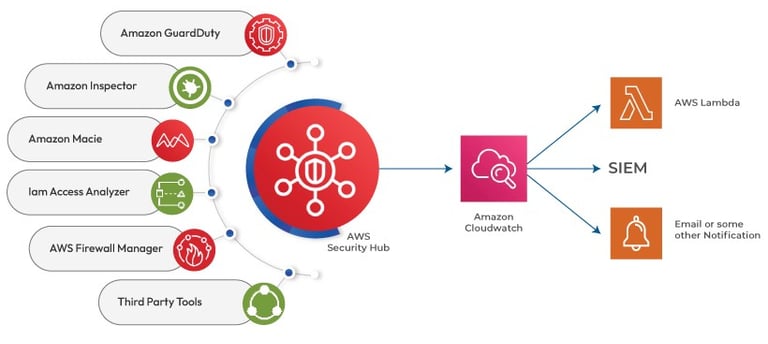Future-Proof Your Cloud Infrastructure in aws
Learn how to future-proof your cloud infrastructure with insights from AWS consultants. Discover tips on using Amazon Web Services (AWS), optimizing costs, enhancing security, and leveraging tools like AWS S3, Lambda, and CloudFormation for a reliable, scalable, and secure cloud environment.


Introduction
In our digital world, a strong and dependable cloud infrastructure is crucial for businesses of all sizes. Many companies are shifting to the cloud to store data, run applications, and expand their operations. One of the top choices for cloud services is Amazon Web Services (AWS). AWS is like a vast toolkit offering a variety of tools to help businesses in numerous ways. In this article, we will explore how to future-proof your cloud infrastructure using AWS, with insights from experienced AWS consultants.
What is AWS?
AWS, or Amazon Web Services, is a comprehensive platform offering a wide array of cloud services. Think of it as a massive store where you can find everything you need for cloud computing. From storage and databases to machine learning and security, AWS provides it all. One of the best features of AWS is that you only pay for what you use, making it a cost-effective solution.
Why Choose AWS?
AWS is a popular choice for many reasons:
1. Reliability: AWS is renowned for its reliability. With data centers spread across the globe, your data remains safe even if one center experiences issues.
2. Scalability: AWS allows you to easily scale your resources up or down based on your needs, ensuring you can handle varying levels of traffic efficiently.
3. Security: AWS offers robust security features to protect your data.
4. Flexibility: AWS provides a vast range of services that can be tailored to meet your specific requirements.
The Role of AWS Consultants
AWS consultants are experts in leveraging AWS to its fullest potential. They assist businesses in optimizing their use of Amazon Web Services. Here’s what AWS consultants typically do:
1. Assessment: Evaluate your current infrastructure to identify areas for improvement.
2. Planning: Develop a strategic plan for transitioning to AWS.
3. Migration: Help migrate your data and applications to AWS.
4. Optimization: Fine-tune your AWS setup for maximum performance.
5. Security: Ensure your AWS environment is secure.
6. Maintenance: Provide ongoing support and maintenance.
Insights from AWS Consultants
Let’s delve into some key insights from AWS consultants on how to future-proof your cloud infrastructure.
1. Utilize AWS S3 for Storage
AWS S3 is one of the most popular services provided by Amazon Web Services (Simple Storage Service). Large volumes of data can be stored in scalable ways with its storage options. Here are some tips for using AWS S3:
- Durability: AWS S3 boasts 99.999999999% durability, ensuring your data is highly secure.
- Scalability: Store unlimited data without worrying about capacity.
- Security: AWS S3 provides encryption and access control to safeguard your data.
- Cost-Effectiveness: Pay only for the storage you use, making it an economical choice.
2. Implement Auto Scaling
Auto Scaling is a feature that automatically adjusts the number of instances in your application based on demand. Here’s how it helps:
- Save Money: Stop paying for resources you don't use during slow times.
- Performance: Ensure your application can handle high traffic seamlessly.
- Reliability: Replace unhealthy instances automatically in order to keep performance high.
3. Leverage AWS Lambda
You can run code without provisioning or managing servers by utilizing serverless computing technologies like AWS Lambda. Benefits include:
- Cost-Efficiency: Only pay for the actual computation time used.
- Scalability: Automatically scale your application by running code in response to triggers.
- Maintenance-Free: Eliminate the need to manage servers, reducing maintenance efforts.
4. Strengthen Security Practices
When it comes to cloud infrastructure, security is crucial. Here are some recommended security practices:
- Use AWS Identity and Access Management (IAM): Control access to AWS services and resources securely.
- Enable Multi-Factor Authentication (MFA): Add an extra layer of security to your AWS account.
- Regular Audits: Conduct regular audits to identify and address security vulnerabilities.
5. Optimize Costs
Managing costs is crucial when using cloud services. Here are some cost-optimization tips:
- Use Reserved Instances: Benefit from significant discounts compared to On-Demand Instances.
- Monitor Usage: Utilize AWS Cost Explorer to monitor your usage and identify savings opportunities.
- Optimize Storage: To transfer rarely accessed data to less expensive storage types, implement lifecycle policies.
6. Backup and Disaster Recovery
It is crucial to have a strong backup and disaster recovery plan. Here are some tips:
- Regular Backups: Ensure regular data backups to facilitate recovery in case of a disaster.
- Use AWS Backup: The backup procedure for all AWS services is made simpler and more automated with AWS Backup.
- Test Recovery Plans: To make sure your disaster recovery plan is working, test it frequently.
7. Utilize AWS CloudFormation
AWS CloudFormation helps you model and set up your AWS resources efficiently. Benefits include:
- Infrastructure as Code: Define your infrastructure as code for easy replication of environments.
- Consistency: To reduce the likelihood of configuration issues, and maintain consistency between environments.
- Automation: Automate the provisioning and updating of your infrastructure.
8. Employ AWS Monitoring Tools
Monitoring your AWS environment is crucial. Here are some tools to use:
- Amazon CloudWatch: Real-time monitoring of your AWS resources and applications.
- AWS CloudTrail: Maintains a history of AWS API calls and monitors user activity and API utilization.
- AWS Trusted Advisor: Offers real-time guidance for provisioning resources following AWS best practices.
9. Stay Updated with AWS Training and Certifications
AWS is constantly evolving. Here’s how to stay updated:
- AWS Training: Take advantage of training programs to learn about new features.
- AWS Certifications: Earn certifications to validate your expertise.
- AWS Documentation: Regularly check AWS documentation for updates and best practices
10. Collaborate with AWS Partners
AWS has a vast network of partners providing additional expertise and support. Here’s how to collaborate:
- Consulting Partners: Work with consulting partners for expert advice.
- Technology Partners: Integrate third-party solutions with AWS through technology partners.
- Marketplace: Explore AWS Marketplace for ready-to-use software and services.
Conclusion
Future-proofing your cloud infrastructure with AWS involves leveraging the right tools and best practices. AWS offers a vast array of services and features that can help you build a reliable, scalable, and secure cloud environment. By following insights from AWS consultants, you can ensure your cloud infrastructure is ready for the future. Whether using AWS S3 for storage, implementing auto-scaling, or optimizing costs, there are numerous ways to maximize the benefits of Amazon Web Services. Stay updated with the latest AWS training and certifications and collaborate with AWS partners to achieve the best results. Happy cloud computing!





